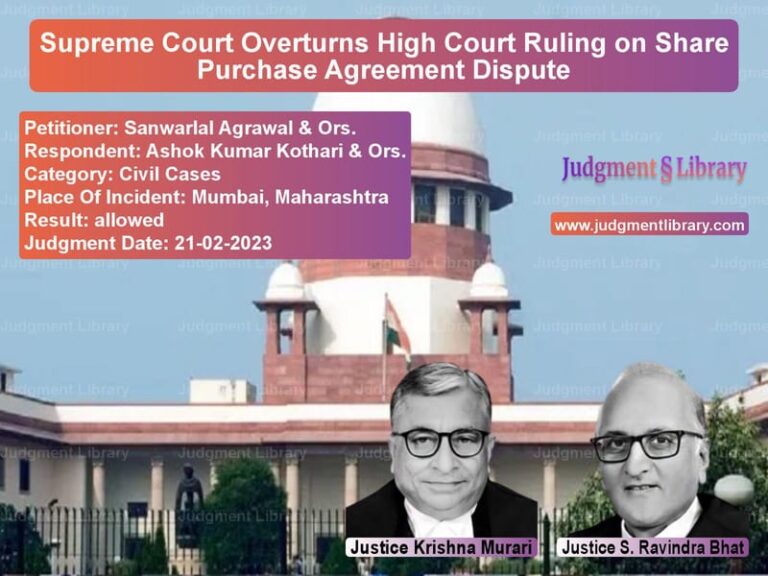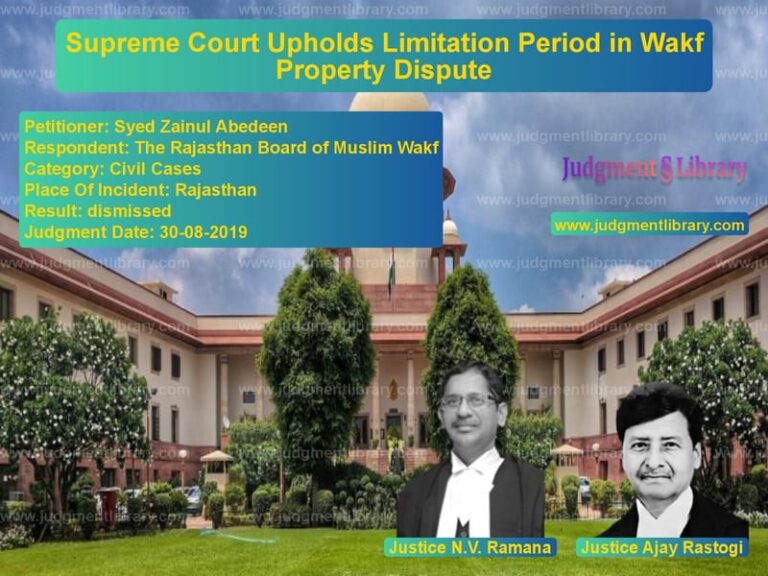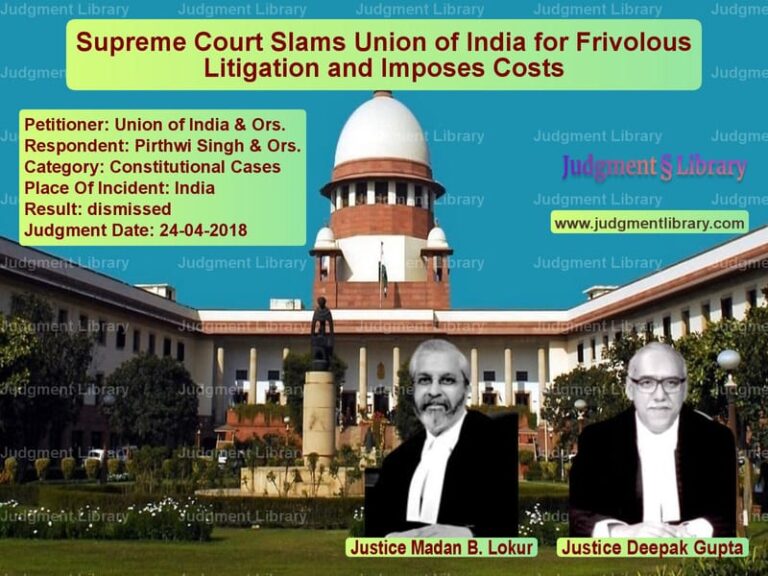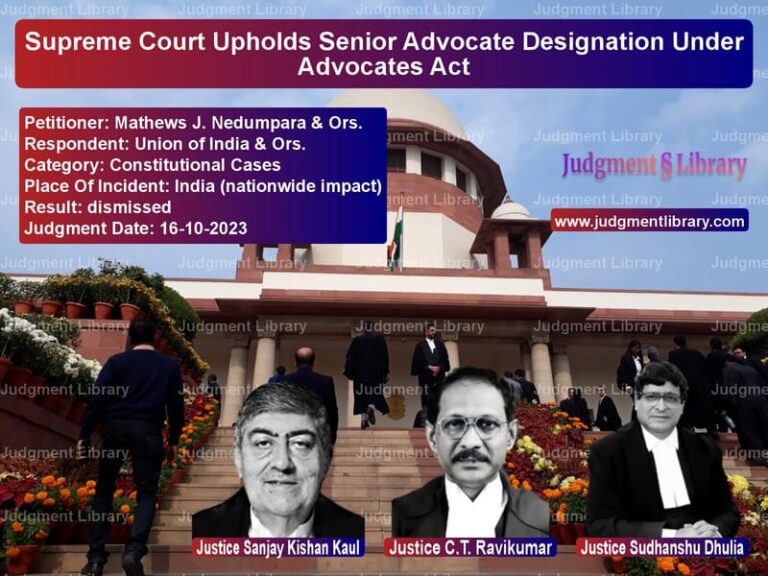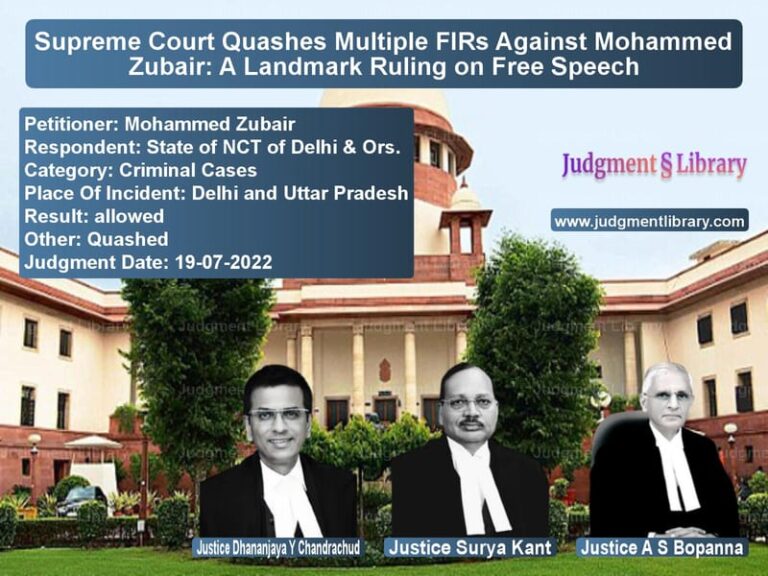Supreme Court Reduces Sentence in Haryana Assault Case: Bijender v. State of Haryana
The Supreme Court of India, in the case of Bijender @ Papu & Anr. v. State of Haryana, ruled on an appeal concerning the sentence imposed on the appellants in a criminal case involving a group assault. The Court modified the sentence for the appellants, reducing their imprisonment term from five years to three years under Section 325 read with Section 149 IPC.
Background of the Case
The case arose from a violent altercation in 1997 over a dispute related to drainage rights. The appellants, along with three others, were convicted under Sections 325/149, 148A, 308/149, and 323/149 IPC for causing grievous hurt. The trial court sentenced them to:
- Three years rigorous imprisonment (RI) under Section 308/149 IPC.
- Fines amounting to Rs.12,000 each.
- Out of the fine collected, Rs.70,000 was to be paid as compensation to the victim, Budhram.
The High Court upheld the conviction but enhanced the sentence:
- Five years rigorous imprisonment under Section 325/149 IPC.
- Fine increased to Rs.20,000 each, with an additional one-year RI in case of default.
The appellants then approached the Supreme Court, challenging the sentence enhancement.
Arguments by the Appellants
- The appellants sought parity with their three co-accused, who were released on probation due to their advanced age (75-85 years).
- They had already undergone a prolonged legal battle for 19 years, making further imprisonment unduly harsh.
- The injury suffered by the victim, Budhram, though grievous, was caused by an unknown assailant, as no prosecution witness could identify the specific person responsible.
Arguments by the Respondent (State of Haryana)
- The state argued that the injuries suffered by Budhram were severe, leaving him mentally impaired.
- The High Court had justifiably enhanced the sentence considering the gravity of the injuries.
- The trial court had already shown leniency by sentencing the appellants to three years RI instead of a higher sentence.
Supreme Court’s Observations
1. No Specific Attribution of Injury
The Court noted that no prosecution witness could pinpoint which accused caused Budhram’s head injury, leading to mental impairment. It held:
“Had the prosecution witnesses been able to pinpoint the accused who caused the head injury on Budhram, we would have definitely treated him to be responsible for a graver offense meriting higher punishment.”
2. Parity with Other Convicts Not Justified
The Court rejected the appellants’ plea for parity with their co-accused, stating:
“The concession shown to the other three convicts was mainly on the ground of their extreme old age, and that justified the special treatment extended in their case.”
3. Dispute Over Drainage Rights
The Court considered the origin of the altercation—a dispute over drainage rights—and concluded:
“The genesis of the occurrence, which was on account of a dispute between the parties over a right to have a drain in a passage, persuades us to reduce the period of sentence.”
Supreme Court’s Final Decision
- The appeal was partially allowed.
- The sentence under Section 325/149 IPC was reduced from five years to three years rigorous imprisonment.
- The fine amount and conviction for other offenses remained unchanged.
- The appellants were required to serve the modified sentence.
Implications of the Judgment
1. Balanced Sentencing Approach
The judgment highlights that courts must balance the severity of the crime with mitigating factors, such as prolonged legal battles and lack of specific attribution of injuries.
2. No Automatic Parity in Sentencing
The ruling clarifies that release on probation due to old age does not entitle co-accused to the same relief unless they share similar circumstances.
3. Emphasis on Precise Identification in Assault Cases
The judgment reinforces that when multiple accused are involved, the prosecution must specifically identify the individual responsible for grievous injuries to impose higher sentences.
Conclusion
The Supreme Court’s ruling in Bijender @ Papu v. State of Haryana is a significant decision in criminal sentencing jurisprudence. By reducing the sentence while maintaining the conviction, the Court balanced the interests of justice and the principle of proportionality in sentencing.
Don’t miss out on the full details! Download the complete judgment in PDF format below and gain valuable insights instantly!
Download Judgment: Bijender @ Papu & An vs State of Haryana Supreme Court of India Judgment Dated 03-06-2016-1741872326090.pdf
Direct Downlaod Judgment: Direct downlaod this Judgment
See all petitions in Custodial Deaths and Police Misconduct
See all petitions in Judgment by Dipak Misra
See all petitions in Judgment by Shiva Kirti Singh
See all petitions in partially allowed
See all petitions in Modified
See all petitions in supreme court of India judgments June 2016
See all petitions in 2016 judgments
See all posts in Criminal Cases Category
See all allowed petitions in Criminal Cases Category
See all Dismissed petitions in Criminal Cases Category
See all partially allowed petitions in Criminal Cases Category



